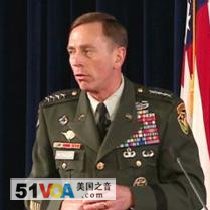Washington
02 April 2009
 |
| General Petraeus (file photo) |
Referring to a "downward security spiral in key parts" of Afghanistan and Pakistan, Petraeus said disrupting and ultimately defeating al-Qaida and other extremist elements will require a sustained and substantial commitment.
As was the case in Iraq, he told the House Armed Services Committee, additional U.S. forces deploying to Afghanistan at the order of President Obama will not by themselves be sufficient.
Petraeus said this will require a comprehensive counter-insurgency approach combined with steps to meet civilian requirements, while not alienating populations. "The additional forces will only be of value if they are employed properly. It is vital that they be seen as good guests and partners, not as would-be conquerors or superiors and as formidable warriors who also do all possible to avoid civilian casualties in the course of combat operations," he said.
General Petraeus said the United States will help Pakistan build its counterinsurgency capabilities, and work to promote closer cooperation and coordination between Afghanistan and Pakistani forces with training, equipment, facilities and intelligence.
But while Pakistan has stepped up operations against militants and extremists, he said further work is needed. "Although there has been progress in some areas as Pakistan's newly reestablished democracy has evolved, significant security challenges have also emerged. The extremists that have established sanctuaries in the rugged border areas not only contribute to the deterioration of security in eastern and southern Afghanistan, they also pose an ever more serious threat to Pakistan's very existence," he said.
Navy Admiral Eric Olson, head of the U.S. Special Operations Command, described the situation as "increasingly dire," saying U.S. and allied forces must be prepared for a long campaign. "We know well that progress in Afghanistan and Pakistan will be neither quick nor easy. We as a nation and an international community must be prepared for an extended campaign, and one that must go well beyond traditional military activities," he said.
Under Secretary of Defense for Policy, Michele Flournoy, said the United States seeks a long-term strategic partnership with Pakistan, saying its ability to dismantle terrorist safe havens and defeat insurgent networks is "absolutely critical" to its security.
A long-term relationship with Afghanistan, she said, will involve counter-terrorism and counter-insurgency training, combating government corruption and the narcotics trade, and addressing social-economic problems. "Combating corruption will be a critical part of our effort to reinforce Afghan institutions at all levels of the government. These efforts must also address the root causes of the insurgency, build accountability and give the Afghan people more reason to support and invest in their own government," she said.
House Armed Services Committee Chairman, Democrat Ike Skelton said that while the United States is committed to a consistent and long-term relationship with Pakistan and Afghanistan, Congress must closely monitor the impact of American assistance to both countries. "The Congress and the American people are being asked to put up a significant amount of resources over a sustained period so there must be accountability and there must be a measurable return on this investment," he said.
John McHugh, the ranking panel Republican suggested that Afghan military and police forces might have to be expanded beyond current goals. "In my opinion, I think we're going to have to go even beyond the current numbers and perhaps as much as double the previously authorized numbers for both the Afghan army and the police," he said.
The need for a civilian and military approach in Afghanistan and Pakistan was also a topic of expert testimony to the House Foreign Affairs Committee.
One witness, Anthony Cordesman of the Center for Strategic and International Studies, said President Obama's strategy has the elements for success, but that the United States and NATO lack clear plans for building "credible Afghan security forces" and an effective national police force. "If we are to be successful by the summer of this year, we need to know what is happening, we need to see real progress, and we will need to be able to monitor it and see it more efficiently in the course of these [coming] years," he said.
Karin van Hippel, also of the Center for Strategic and International Studies, said success for President Obama's strategy will require persuading Afghans to support the government and international forces, while directing more aid to the people. "Only when Afghans view the struggle as a common one, that they are not fighting America's war, will they become full partners," he said.
Seth Jones of the RAND Corporation says the U.S. and NATO must do more to correct shortcomings in military and police training, and involve Afghans in counter-insurgent operation. But he says the allies must address more the complex nature of the insurgency. "Important chunks of the motivation for fighting the Afghan government, the Americans and others is very locally-based. And that is important to realize because it means, in my view, that the solutions are not just about a central government. They are also about working with and understanding local dimensions," he said.
House and Senate hearings this week come as lawmakers prepare to receive the Obama administration's $75 billion supplemental request to fund military operations in Afghanistan and Iraq, and work on regular defense appropriations to support the president's strategy.